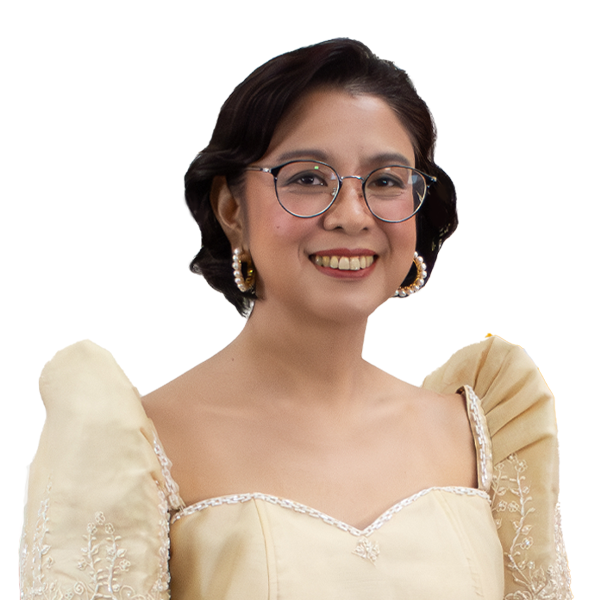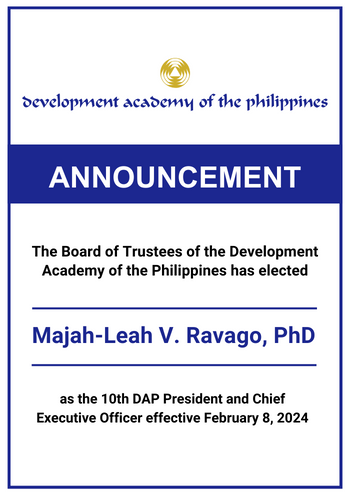The Chevening Alumni Foundation Inc. in collaboration with the Development Academy of the Philippines conducted a forum entitled “Chevening Chats on the Bangsamoro Autonomous Region in Muslim Mindanao or BARMM” on May 2, 2019 at the Development Academy of the Philippines Office in Pasig City.
The said forum is an offshoot of the Chevening Alumni oath taking as members of the Bangsamoro Transition Authority (BTA), which serves as the interim government of the BARMM. The members include Engr. Don Arbison Mustapha Loong who presented the topic “Role of Roads and Bridging Peace and Prosperity in the Bangsamoro;” Atty. Ana Tarhata Basman with her topic “Drafting of the Internal Revenue Code for the BARMM;” and Atty. Maisara Dandamun-Latiph who presented “Education in the BARMM.” These young Bangsamoro leaders discussed the latest information on the BARMM, tackled issues on infrastructure, education, and fiscal autonomy, including their aspirations and plans as BTA members who will craft laws and policies for the region.
DAP President and Chief Executive Officer Atty. Engelbert C. Caronan, Jr. welcomed the partners from Chevening Alumni Foundation, resource speakers and guests from different sectors. In his opening speech, he noted that this forum forms part of the overall strategy of DAP in preparing for its future engagements in Mindanao. The forum, Pres. Caronan added, is aligned with the DAP’s philosophy of knowledge co-creation as a tool in providing solutions to most organizational problems, and this is going to be useful for the DAP to craft culturally sensitive and context-specific interventions.
Pres. Caronan said that the task ahead for the BARMM is far too complex and its component elements are based on extreme sensitivity to initial conditions making it extremely unpredictable. He ended his speech with this statement: “Like most of us, we consider the BARMM as the most important social engineering process of our time. It will acquire a life of its own and it will help to withstand the pressure that history has brought upon it to bear.”
Kabayan Representative and President of Chevening Alumni Foundation of the Philippines Ron Salo briefly shared that Chevening Alumni is an association of recipients of scholarship from the British Government. Chevening Alumni has been holding Chevening Chats to create greater awareness on issues that affect the country. Rep. Salo also mentioned that in April 2019, they conducted the first Chevening Chat on “Transnational Higher Education,” also in partnership with the DAP.
Rep. Salo also informed the audience that Chevening Alumni has already taken rigorous steps, which include meetings with various stakeholders to ensure the integration of the aspirations of the Muslims in the South.
“Our bigger aim is to ensure that we will all live in solidarity. We will all live in a progressive country. We will all live where no one will be left behind. And we trust that this particular discussion will greatly benefit from the ideas to be shared. We trust that the implementers on the ground would be able to use these outputs in order to create an outcome for everyone to benefit; to ensure that it will greatly impact the way we address concerns and issues in our country to create a unity where there will be one Philippines. A Philippines that is more progressive, more developed, and everyone will greatly benefit from it,” the representative concluded.
Highlight of this second Chevening Chat were the presentations that focused on the issues of the BARMM. The first presenter was Engr. Don Mustapha Loong who started by sharing a story about the past, which included the story of the longest running conflict in the world that has been going on for five hundred years already, and down to the history of the conflict in Sulu, Basilan and ARMM; the present, and what they aspire for the future of the BARMM. The former Regional Secretary of the Autonomous Region in Muslim Mindanao-Department of Public Works and Highways (ARMM-DPWH) linked this history to the incessant poverty in ARMM. This poverty, according to him, is not because the Bangsamoro people are lazy, nor because they are not educated. But because for the past 500 years, they were like the Spartans who have been fighting for their religion, culture, descendants and their land, and until now, he said, they are still looking for solutions.
Loong also said that there is a wide development in the country, but not in Sulu, Basilan and BARMM, especially in conflict-affected areas because people cannot go there due to travel prohibitions. “Without roads, there are no opportunities. Because when we are isolated, then there is no empowerment,” said Loong.
He concluded that it is not enough to just have roads. “When roads are built, lives and things in Sulu are changed; mindsets are changed as well, and opportunities will start to arise,” said the honoree of the 2018 UP Alumni Association Distinguished Alumni Award for Public Service and Good Governance.
“The conflict may not have been resolved but we’ve seen that for the past five years in ARMM, it is only the good – building of roads, building of infrastructures to make the government more responsive; giving people houses, homes, and hope – these are actually what will make peace and prosperity sustainable,” ended Loong.
Atty. Ana Tarhata Basman, on the other hand, shared that the BARMM is envisioned to be an improvement of the ARMM specifically on three key areas: an expanded territory, peace adherent to subsidiarity, and fiscal autonomy. She explained that the BARMM is a product of the peace process between the government as represented by the Office of the Presidential Adviser on the Peace Process (OPPAP) and the Moro Islamic Liberation Front (MILF).
Capping the presentation was Atty. Latiph who emphasized that children should be protected, respected, and promoted in the Bangsamoro. The convention on the rights of the child must be fully implemented and promoted in the region and with this, she mentioned that they now have a Tahaderiya under the UNICEF program. This is going to be mainstreamed in the curriculum for children who are at risk and in conflict areas. She eagerly shared that they are looking towards a rights-based approach in education where it is going to be more of a child-led policy.
Over 50 attendees from the government, civil service organizations, embassies, academe, private sectors, including some of DAP’s eminent fellows participated in the forum.




